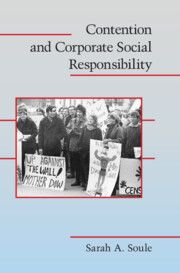Book contents
- Frontmatter
- Contents
- Figures
- Tables
- Preface
- 1 INTRODUCTION
- 2 UNDERSTANDING SOCIAL MOVEMENTS, CONTENTIOUS AND PRIVATE POLITICS, AND THEIR CONSEQUENCES
- 3 ANTICORPORATE PROTEST IN THE UNITED STATES, 1960–1990
- 4 THE EFFECT OF PROTEST ON UNIVERSITY DIVESTMENT
- 5 PRIVATE AND CONTENTIOUS POLITICS IN THE POST-1990 ERA
- 6 CONCLUSION
- Appendix A Description of Data Used in Chapter 3
- Appendix B Modeling Technique Used in Chapter 3
- Appendix C Sources of Data for Analysis in Chapter 4
- Appendix D Modeling Technique Used in Chapter 4
- Bibliography
- Index
5 - PRIVATE AND CONTENTIOUS POLITICS IN THE POST-1990 ERA
Published online by Cambridge University Press: 05 June 2012
- Frontmatter
- Contents
- Figures
- Tables
- Preface
- 1 INTRODUCTION
- 2 UNDERSTANDING SOCIAL MOVEMENTS, CONTENTIOUS AND PRIVATE POLITICS, AND THEIR CONSEQUENCES
- 3 ANTICORPORATE PROTEST IN THE UNITED STATES, 1960–1990
- 4 THE EFFECT OF PROTEST ON UNIVERSITY DIVESTMENT
- 5 PRIVATE AND CONTENTIOUS POLITICS IN THE POST-1990 ERA
- 6 CONCLUSION
- Appendix A Description of Data Used in Chapter 3
- Appendix B Modeling Technique Used in Chapter 3
- Appendix C Sources of Data for Analysis in Chapter 4
- Appendix D Modeling Technique Used in Chapter 4
- Bibliography
- Index
Summary
Thus far in this book I have examined anticorporate activism that occurred in the United States between 1960 and 1990. From this examination, I have emphasized two key dimensions that should be considered when attempting to understand the causes and consequences of anticorporate activism. First, in Chapter 3, I described the importance of examining and understanding the claims expressed by anticorporate activists. By looking carefully at anticorporate activism as reported in the New York Times, I found that most protests initiated by anticorporate activists over this thirty-one-year period articulated claims that fell into one of the following three categories: antiproduct, antipolicy, and negligence. While in many cases activists articulated multiple claims, in general I was able to locate a primary claim that fell into one of these three categories in each report of public protest events that I examined.
Second, in Chapters 2 and 3 I noted the importance of identifying what the target or focal point of a given anticorporate protest event is, noting that oftentimes anticorporate activism is directed at both corporations and the government. This led me to charge that it is critical for scholars of organizations and movements to move beyond their focus on “private politics” and “contentious politics” respectively and recognize that anticorporate activism is sometimes a hybrid of the two. Recall that private politics is the term used by organizations scholars for the class of politics that occurs without any state intervention, activity, or targeting. And, contentious politics is the term used by social movement scholars to refer to instances of activism in which one party (typically the focal point) is the state.
- Type
- Chapter
- Information
- Contention and Corporate Social Responsibility , pp. 104 - 144Publisher: Cambridge University PressPrint publication year: 2009



